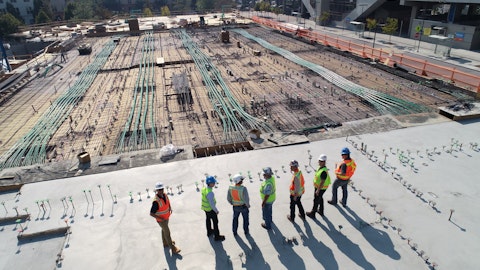So yes, I mean, we — I will say we laid a lot of groundwork, but now it’s focused on ramping up production in our Noblesville facility. The team has done a phenomenal job at ReElement. So they’re focused on ramping up production, running production every day. I think we’re going to — I think we’re going to almost essentially 3 shifts at our Noblesville facility, which is awesome. I really need to see the planning there. And then at the mining side, I mean, Tarlis is pretty aggressively wanting to ramp up and get the complexes at full throttle based on where they’re at today. I mean this is the first time we’ve ever been in a position where the mines could be fully expanded and working with some of the international customers that we have that we’re finalizing some relationships with hopefully, very shortly, will put us in a really good position.
Mike Niehuser: And if I can ask one more question. We’re really at an historic time in our country’s history or the economy’s history here of reestablishing a rare earth circular supply chain. And not only with the ores, but also with the recent announcement or end-of-life materials from an unnamed auto manufacturer, along with the relationship that you have with a couple of battery — or excuse me, magnet manufacturers, can I get a comment upon the state of reconnecting the lengths of the circular economy because I don’t think it will ever be quite like this again? And it’s really starting to take form in multiple ways with the work you’ve done. And that should be my last question.
Mark Jensen : Yes, that’s a — we can talk for a while about. I mean, you look back over the course of the last two years of, one, communicating what we can do, showing what we can do and then bring it into partners that are slow to act. And I will say, today, people aren’t as scared as they should be of the supply chains that we have today. Our military relies upon China for product. That’s scared. I have 2 brothers in the military. If they didn’t have the tools they needed to defend ourselves that would be a scary situation. And so today, getting those recycling — I mean, there’s billions of dollars of magnet landfill every year in the United States alone. And batteries, most of the black mass, meaning the shredded lithium ion batteries today go to China.
It’s unfortunate. And a lot of those companies were funded by the U.S. government that are sending products to China. That’s got to stop. That being said, it’s starting to stop. We’re starting to get a substantial amount of feedstock. And Chris Moorman on our team — our Chief Commercial Officer, has done a phenomenal job of opening up some doors and bringing in product that we can produce. Now we’re thankfully going to 3 shifts because we have so much product coming in. That’s a great thing and focusing aggressively on the Marion facility to ramp up that 400,000 square foot facility, 42 acres. That’s huge for the technology that we utilize. The recycle market is phenomenal. It’s a phenomenal platform for us because we can refine that. We’re replacing that bottleneck.
We’re replacing what’s done in China today. Lifecycle tried to do it, they failed. Not to digs at them, but they couldn’t build a traditional hydromet plan. It’s one, really hard to permit, and two, really hard to operate. Solving extraction in the United States, I think it’s almost impossible to operate economically and impossible to maintain over the long term. On the rare earth side and there’s a rare earth producer in the U.S. trying to do that today. Great. I think they’re doing a great job in the company. I just think they’re going to struggle with that. We can provide the solution to that. We have a platform that we’re going to be announcing here shortly that on the ReElement side that showcases how we can work collaboratively with those partners to bring that separation purification step to them to help them be better too.
We need to protect our supply chains for our country. And ultimately, that works really well for us as a business because that’s revenue and growth. Then on the ore side, why we’re in Africa? Africa is one of the most resource in the world, is one of the fastest-growing populations in the world. And we have phenomenal relationships there between Shane Tragethon, Vice President of National Strategy; Ben Kincaid, CEO of ReElement Africa; Baba Kamara, who just joined us on the Board of ReElement Technologies Africa, just a phenomenal group of people that know Africa really well, but more importantly, know how to work with Africa and not exploit them and work in a partnership-based model with them to help drive value locally in the countries but also give us a tremendous amount of feedstock that we can process domestically as well as in Africa to drive economic growth there but also to secure our supply chains here back at home.
So it’s about securing those feedstocks, which takes time. I mean, you think you can go to somebody and say, “Hey, give me your end of life magnets because you’re not doing anything with them today.” That’s an easy conversation to have. You’d be surprised if it’s not their core focus of every day, what they get paid to do, it takes some time to get comfortable to do that. And — but thankfully, we’re at that point now where it’s starting to flow in, and that’s getting us — putting us in a really, really good position to really ramp up aggressively.



